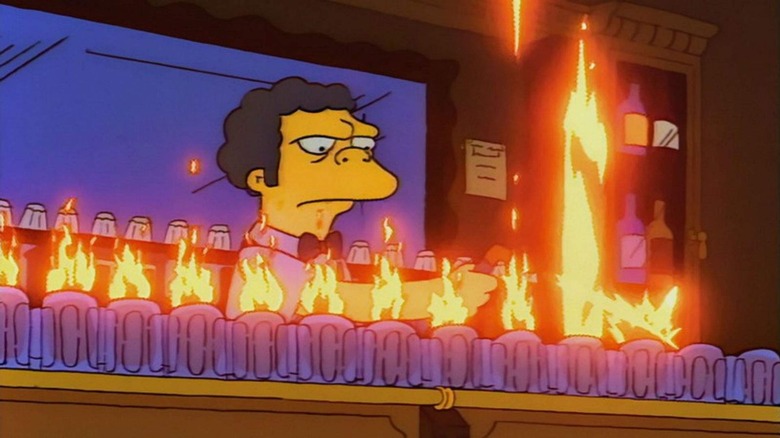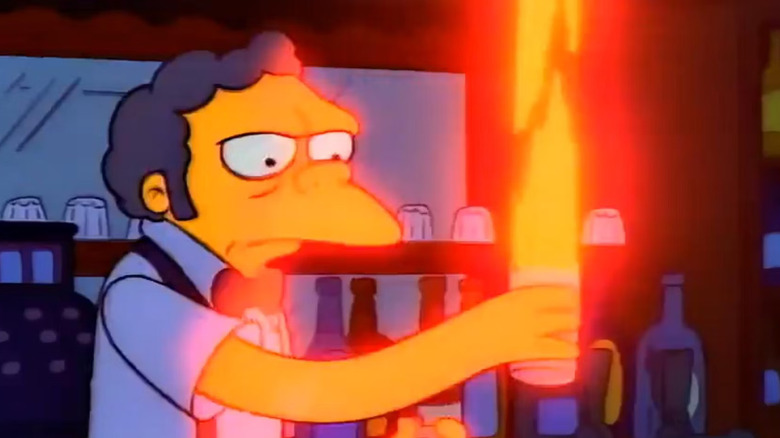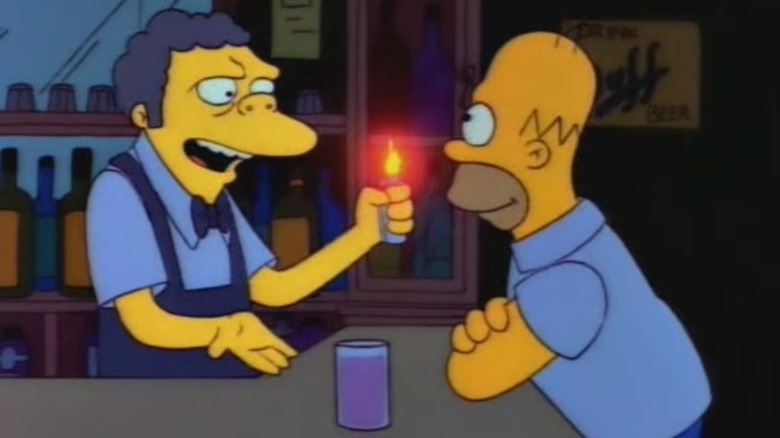Jay Leno Lit The Fuse For The Simpsons Feud That Inspired Flaming Moe's
In the "The Simpsons" episode "Flaming Moe's (November 21, 1991), the put-upon bartender Moe Szyslak (Hank Azaria) finds his bar struggling to stay afloat in the wake of increased job satisfaction and family bliss in the city. Homer (Dan Castellaneta) suggests Moe try a new cocktail. Homer then reveals the recipe for a cough syrup-infused drink — the Flaming Homer — that becomes more flavorful after you set it on fire. Moe mixes one and it's an instant hit. Moe also instantly claims credit for inventing the drink, much to Homer's consternation.
The redubbed Flaming Moe is a huge success, and Moe's dive bar quickly grow into a massive event space where Aerosmith performs. Eventually Homer, fed up with not receiving any credit or money, reveals the secret ingredients and Moe's quickly returns to being a dive.
This episode, written by Robert Cohen, was inspired by a similar "rivalry" between "Simpsons" creator Matt Groening and one of the show's key developers Sam Simon. Simon was a character designer on "The Simpsons," as well as an executive producer, creative supervisor, showrunner, and writer. He was one of the central people responsible for getting "The Simpsons" off the ground; we wouldn't have the show without him. Simon left "The Simpsons" in 1993, but retained executive producer credits even after he died in 2015.
Groening has never been an egomaniac, and always openly shared the names of his "Simpsons" collaborators, understanding that he only invented the characters and the premise. Animators, actors, producers, and writers made the show great. There was an incident, however, when Jay Leno didn't let Groening say Simon's name on national TV. A rivalry ensued.
The story of the "rivalry" is told at length in the behind-the-scenes book "Springfield Confidential" by Mike Reiss and Matthew Kleinstein.
Sigh, thanks Jay Leno
Simon was always being overlooked. "Springfield Confidential" recalled the exciting time when "The Simpsons" first debuted, and the flurry of newspaper articles mentioning its success. Evidently, Simon would look through reviews, essays, and other reportage and find his name missing from all of them. Groening was mentioned, as was executive producer James L. Brooks, but Simon began to feel like "the other guy."
Simon had previously worked on hit shows like "Cheers" and "Taxi," and he was the one who assembled and led the "Simpsons" writer's room. Regardless, Groening was cited as the sole driving force behind the show. It was Groening who was interviewed by the trades, and Groening who was invited to speak on "The Tonight Show." Indeed, when Groening visited "The Tonight Show" on September 26, 1991, the cartoonist aimed to give credit where credit was due and name all of the best "Simpsons" team members on the air. Jay Leno, sadly, kept cutting him off. For Leno, it seems the more interesting story was that a sole underground cartoonist rattled all of pop culture single handedly, not that a dedicated team of hardworking, old-school professionals made a great show.
By Mike Reiss' estimation, the constant veneration of Groening paired with the dearth of credit he received, made Simon livid. Reiss compared him to Salieri from "Amadeus," furious that the "young upstart" was taking over the world, while he, a genius, still languished in obscurity. Eventually, Simon started treating Groening poorly in the office, glowering at him and making snide remarks at his expense.
It should come as no surprise that Simon pitched the idea for "Flaming Moe's," a story about one person — Moe — receiving all the credit for another person's hard work — Homer.
Parting on ... okay terms
According to Reiss, Groening wasn't happy with the situation either. He was experiencing the glories of creating a hit TV series, but hated that going to the office included headbutting with Sam Simon. Luckily, Simon's resentments made for a pretty good episode. "Flaming Moe's" is a fun episode, and has inspired amateur mixologists all over the world to recreate a Flaming Moe ... or Flaming Homer ... themselves.
Simon's bitterness made working on "The Simpsons" really dour for many of the show's writers; it's hard to work for a boss who's angry all the time and feels they are being treated unfairly. When Simon left in 1993, it was mutually agreed to be best for everyone. Sam stopped running "The Simpsons," and Al Jean and Mike Reiss took over. The show became more absurd under their supervision, and continued to be a massive hit. "The Simpsons" is currently about to enter is 1,751st season ... or something close to it.
Sam Simon went on to oversee multiple other hit TV shows like "The Drew Carey Show," "The Norm Show," "The George Carlin Show," and "Friends." He was a writer and executive producer on "House of Cards" (pre-Spacey revelations) and creator of the poker tournament "Sam's Game" on the Playboy Channel. He was a poker champ and a Playboy fan who was briefly married to Playmate Jami Ferrell. He won nine Emmys. American TV would look very, very different without Sam Simon, so perhaps he was right to be as grumpy as he was over "The Simpsons."
He died in 2015 at the age of 59, taken by colorectal cancer. He said he wanted the bulk of his fortune to be donated to charities.


